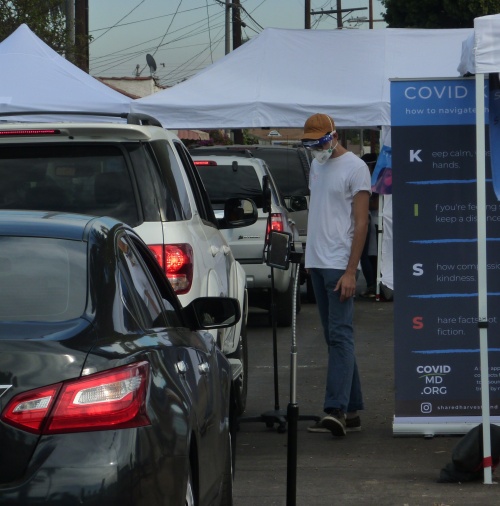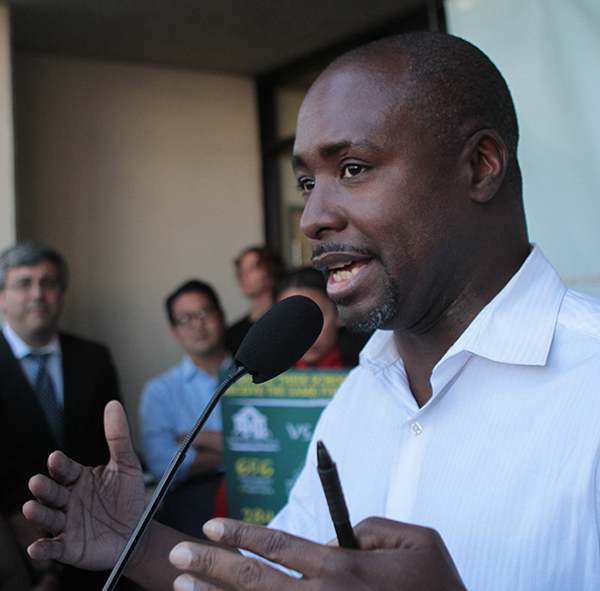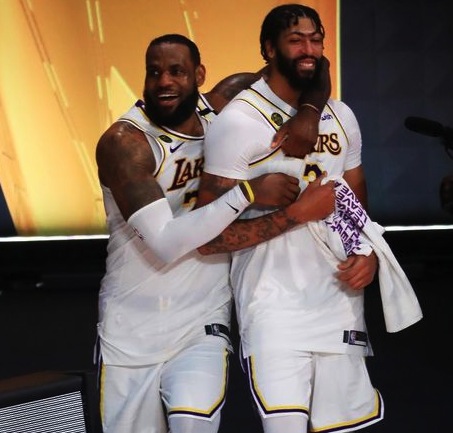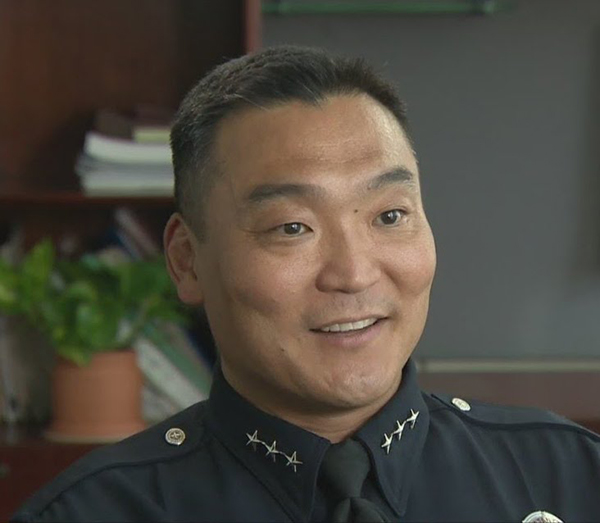Black coach pioneer George Raveling dies
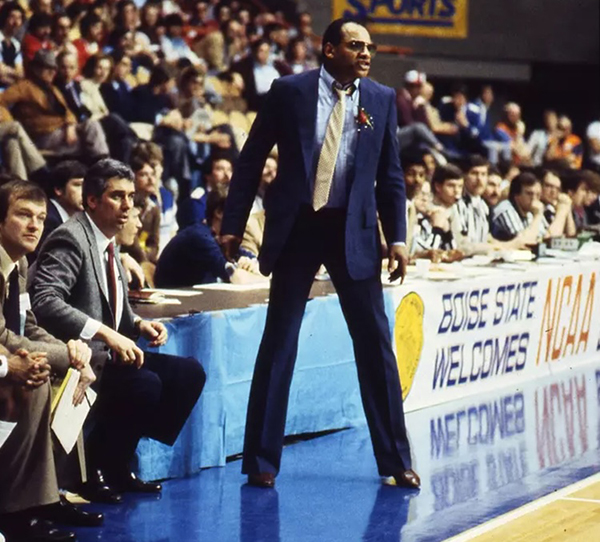
George Raveling, a former basketball coach who also possessed the hand-written copy of the Rev. Martin Luther King’s ‘I Have a Dream’ speech, died Sept. 2 at the age of 88. Raveling coached at Washington State, Iowa and USC and was an assistant coach on the 1964 U.S. Olympic team.
Courtesy photo
Wave Wire Services
LOS ANGELES — George Raveling, whose Basketball Hall of Fame coaching career concluded with an eight-season stint at USC, led Michael Jordan to sign with Nike and owned the typewritten copy of Martin Luther King Jr.’s
“I Have a Dream” speech, has died at age 88, his family announced Sept. 2.
“It is with deep sadness and unimaginable pain that we share the passing of our beloved `Coach,’ George Henry Raveling, who faced cancer with courage and grace,” his family said in a statement.
“He transitioned peacefully at 88, surrounded by family, as well as love, faith and sacred protection.”
Born June 27, 1935, in what his family described as a segregated hospital in Washington, Raveling began his playing career at St. Michael’s, a Catholic boarding school in Hoban Heights, Pennsylvania.
Raveling was a record-setting rebounder at Villanova, and ranks 13th on the program’s all-time list with 835 during a three-season career from 1957-60. Freshman were not allowed to play on the varsity level until 1972.
Raveling began his coaching career at Villanova where he was an assistant from 1963-69, the first Black person to hold the position, then was an assistant coach at Maryland from 1969-72, also the first Black person to hold that position.
Raveling became the first Black basketball coach in the then-Pacific 8 Conference, now the Pac-12 Conference, in 1972 when he was hired by Washington State. He coached the Cougars to a 167-136 record over 11 seasons, including two NCAA tournament berths.
Raveling was selected as the conference’s coach of the year in 1976 and 1983. He also received the award in 1992 while coaching at USC.
When Raveling guided Washington State to the 1979 tournament, it was its first appearance in the tournament since 1941 when it was the national runner-up.
In a 2013 interview with the school’s athletic website, Raveling said his favorite memory at Washington State was an 80-64 victory in 1980 in Pullman, Washington over a Larry Brown-coached UCLA team that would advance to the NCAA championship game.
The victory ended the Cougars’ 27-game losing streak against the Bruins.
“While I was happy with our win over UCLA, the most touching moment in my career came after the game when I was called back on the court to speak,” Raveling wrote in a letter to Washington State’s student newspaper, The Evergreen, shortly after the game.
“That has to go down as one of the most emotional times in my life. I was truly at a loss for words.”
In the 2013 interview, Raveling said he most enjoyed coaching at Washington State.
“That’s no disrespect to Iowa or USC but the 11 years I spent at WSU was priceless,” Raveling said.
Raveling then coached Iowa for three seasons to a 54-38 record and NCAA tournament berths in his final two seasons.
Raveling was hired by USC in 1986 to replace Stan Morrison and quickly revoked the scholarships of three star freshmen, Hank Gathers, Bo Kimble and Tom Lewis, after they did not respond to a deadline he had set to commit to remaining at USC.
Lewis transferred to Pepperdine. Gathers and Kimble transferred to Loyola Marymount, where they led the Lions’ high-scoring teams. Gathers collapsed during a semifinal game of the 1990 West Coast Conference tournament and was pronounced dead at a hospital a short time later as the result of a heart problem.
Kimble led Loyola Marymount to the Elite 8, losing to eventual champion Nevada Las Vegas.
Raveling coached the Trojans to NCAA tournament berths in 1991 and 1992 and an overall record of 115-118. He retired from coaching in 1994 after being seriously injured in a two-car collision.
Following his coaching career Raveling was a broadcast analyst on CBS and Fox basketball telecasts and director of grassroots basketball and director of international basketball for Nike. He was elected to the Basketball Hall of Fame in 2015.
Raveling was an assistant coach with the 1984 gold medal-winning U.S. Olympic basketball team, where he got to know Michael Jordan, and the bronze-medal winning 1988 team.
“I’m deeply saddened to hear about George’s passing,” Jordan said in a statement. “For more than 40 years, he blessed my life with wisdom, encouragement and friendship. He was always a mentor in every sense and I’ll always carry deep gratitude for his guidance.
“I signed with Nike because of George and without him, there would be no Air Jordan. He lived an extraordinary life, breaking so many barriers and paving the way for so many who came after him.”
On Aug. 26, 1963, Raveling was having dinner in Delaware at the house of his friend Warren Wilson when Wilson’s father Woodrow, asked if they would be attending the March on Washington two days later. Both said no because they didn’t have money and didn’t have a car, Raveling said in the 2013 interview with the Washington State Magazine.
The elder Wilson gave his son and Raveling money and use of one of his cars. The two arrived in Washington the night before the march to walk the grounds and “just get a feel for what it was going to be like,” Raveling said.
“We ran into a gentleman who asked if we were coming to the march.” Then, “he asked if we were interested in volunteering, and we said, ‘For what?’”
Because both were over 6 feet tall, Raveling recalled the man telling them, “You guys would be great for security, and we said, ‘OK, we’ll do it.’”
Raveling had a spot on the podium to the left of the lectern.
“As soon as [King] was done we were to move in and secure him and the people on the dais, and get them out the back,” Raveling said. “Just as he was finishing, we started to move closer toward the podium. Of course, when he finished, the crowd went crazy.
“I was right there beside him. I said, ‘Dr. King, can I have that copy?’”
King was folding his speech and then handed it to Raveling. Raveling said he had turned down $3 million for the speech. In 2021 he donated it to Villanova, which collaborated with The Smithsonian and the National Museum of African American History and Culture to establish an exclusive, long-term “on loan” arrangement.

